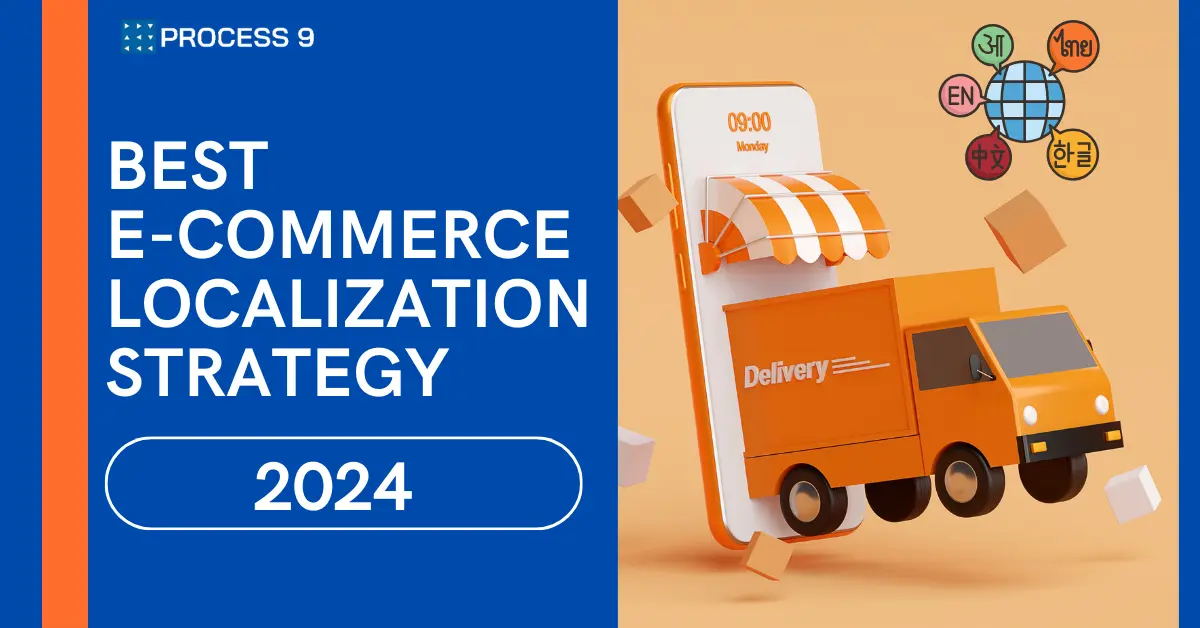The growth of internet infrastructure has resulted in some major changes in the online shopping behavior of consumers. From daily needs to luxurious brands, everything is available on e-commerce platforms with expedited delivery options. According to the latest statistics, the number of online shoppers in India is supposed to be 378 million by 2025. With the increased number of diverse customers, e-commerce retailers are looking at various ways of garnering more loyal customers and maintaining a better relationship with them. Today’s e-commerce giants believe website and mobile app localization is the secret to success if they want to maintain their competitive edge across multiple markets and give customers an unmatched shopping experience.
E-commerce Localization: What and Why?
The process of adapting every component of an online store (app or website), including the visual and textual content to make it more appealing to consumers in the target market is known as e-commerce localization. Localization adds various multilingual features to the e-commerce platform. The various aspects of e-commerce localization include
- Content Localization
- Marketing Localization
- Customer service Localization
- UI Localization
- UX Localization
With e-commerce localization, you can connect better with your target market’s audience by communicating in a language of your choice. Once you can connect with your audience and engage them better, they will likely make more purchases and stay loyal to your brand. The right localization efforts can help you run your business beyond your geographical boundaries. Some of the key reasons why you should go for e-commerce localization are
- Enhanced customer satisfaction
- Better Net Promoter Score
- Increase in website traffic
- Better conversion rates
With an aim to cater to a potential user base of 377 million in India, the well-known e-commerce brand Meesho introduced eight new languages in 2022: Bengali, Telugu, Marathi, Tamil, Kannada, Malayalam, and Odia. This initiative has helped to strengthen their regional foothold. Meesho is the fastest-growing e-commerce platform as of 2024, with an average of 120 million monthly active users.
Essential components for the finest localization strategy.
In the highly competitive world of e-commerce, a negative customer experience can seriously damage a brand. These days, every consumer wants a faultless, customized experience across all of their purchasing touchpoints. Additionally, it is critical to manage local preferences while remaining relevant in a variety of markets. You can communicate that your e-commerce business is trustworthy and dependable by using a consistent brand message across a variety of markets. When it comes to localizing your e-commerce platform, some key components should be considered, such as,
○ Market research
It is critical to thoroughly investigate your target market before starting any localization efforts. Market research allows you to obtain relevant information and insightful knowledge about consumers, their behavior, and e-commerce in that particular market. There are many ways to conduct research, including gathering market data, studying competitors, analyzing customer information, and keeping an eye on industry trends. With the help of the latest analytics tools and platforms, you can get more information about purchasing behaviors and consumer preferences, enabling targeted localization efforts. By engaging with local influencers and experts, you can gain a better perspective on your target market.
○ Content localization
You can achieve the highest return on investment from localization by translating your content using a systematic approach. Localizing the important content components—such as prominent product descriptions and marketing copy—should be given top priority. While the less critical content, can be machine-translated, the content that contributes to the search engine ranking needs to be run through a human editing process. Understanding the target audience’s linguistic preferences and cultural sensitivities is crucial. It is crucial to regularly monitor and update user content in response to feedback from users and market trends to guarantee its relevance and effectiveness.
○ Multilingual SEO
Some keywords and key phrases that people use when searching online may not always be included in a direct translation of the text. If the search engine is not able to understand that you are offering unique content for specific locales, they might penalize you if there is an overlap between pages. Therefore, you need to follow some explicit SEO best practices whenever you localize your e-commerce platforms. You can localize your entire sitemap by replacing your source code domain with a localized one, or you can add hreflang tags/ attributes to your page so that the search engine can identify that the page is written in a certain language. Meta tag localization is crucial to convey relevant information to search engines in different languages. Keyword localization enhances the discoverability and engagement of the content across multiple languages.
○ Localize your payment methods
Payment is one of the last touch points in the shopping journey of an online customer. The preferred payment method in each market can be different. It is crucial to offer a variety of payment options and highlight the ones that are locally most preferred. Providing familiar payment gateways increases the customer’s trust and makes the checkout process easy. Using localized content and visual cues to guide the customer throughout the payment process builds their trust in your brand. You can maximize your conversion rate by optimizing the checkout process based on the common preferences of the user.
○ Compliance with local regulations
Every country has varied laws and regulations governing e-commerce platforms. Every country has different import-export regulations, data protection laws, and sales tax collection procedures. Respecting local laws and ordinances is crucial for gaining a fair entry into a prospective new market. The regulations such as GDPR are to make sure that businesses handle customer data with responsibility. If you don’t comply with the local regulations as you start your business in the new market, you might face financial reputational, and operational risks.
○ Localized customer support
When your customer support services are provided in the user’s language of choice, you open a channel for seamless communication and an effective way to gain their trust for good. By communicating in various customer support channels, like email, live chat, phone support, etc in the customer’s preferred language, you can resolve their issues promptly, You can also offer localized self-service resources in multiple languages so that clients can resolve their issues independently.
○ Localized market campaigns
It is essential to customize your marketing messages based on the choices and preferences of your target market. You can capture the audience’s attention quickly when you create localized marketing messages that are supported by relevant images, references, and cultural symbols of that market. With the help of customer insights gathered via market research, you can streamline the adaptation of marketing messages across various regions. You can achieve better engagement, sustainable growth, and brand loyalty by driving localized marketing campaigns.
Process Nine Technologies: Your go-to partner for the best localization experience
Process Nine Technologies’ cutting-edge MoxVeda localization platform has the power to completely change your online store. By localizing your e-commerce application with MoxVeda, you can ensure translation accuracy and consistency without having to make changes to the code or databases. Text translation is no longer a tedious manual process thanks to MoxVeda. The system interprets text in English automatically, converts it to the target language, and updates the translations in real time to correspond with your e-commerce app’s English version. With its seamless localization process and compatibility with all CMS platforms and tech stacks, the MoxVeda platform can help your e-commerce business expand beyond borders while giving you total control over your content. The neural machine translation engine devised by Process9 is called MoxWave. MoxWave can be used to overcome any challenges associated with multilingual SEO.MoxWave is also an effective tool for seamless chatbot localization.
Call our localization experts today to book a free demo and step into the new era of e-commerce where you can go global and stay local.







Share: